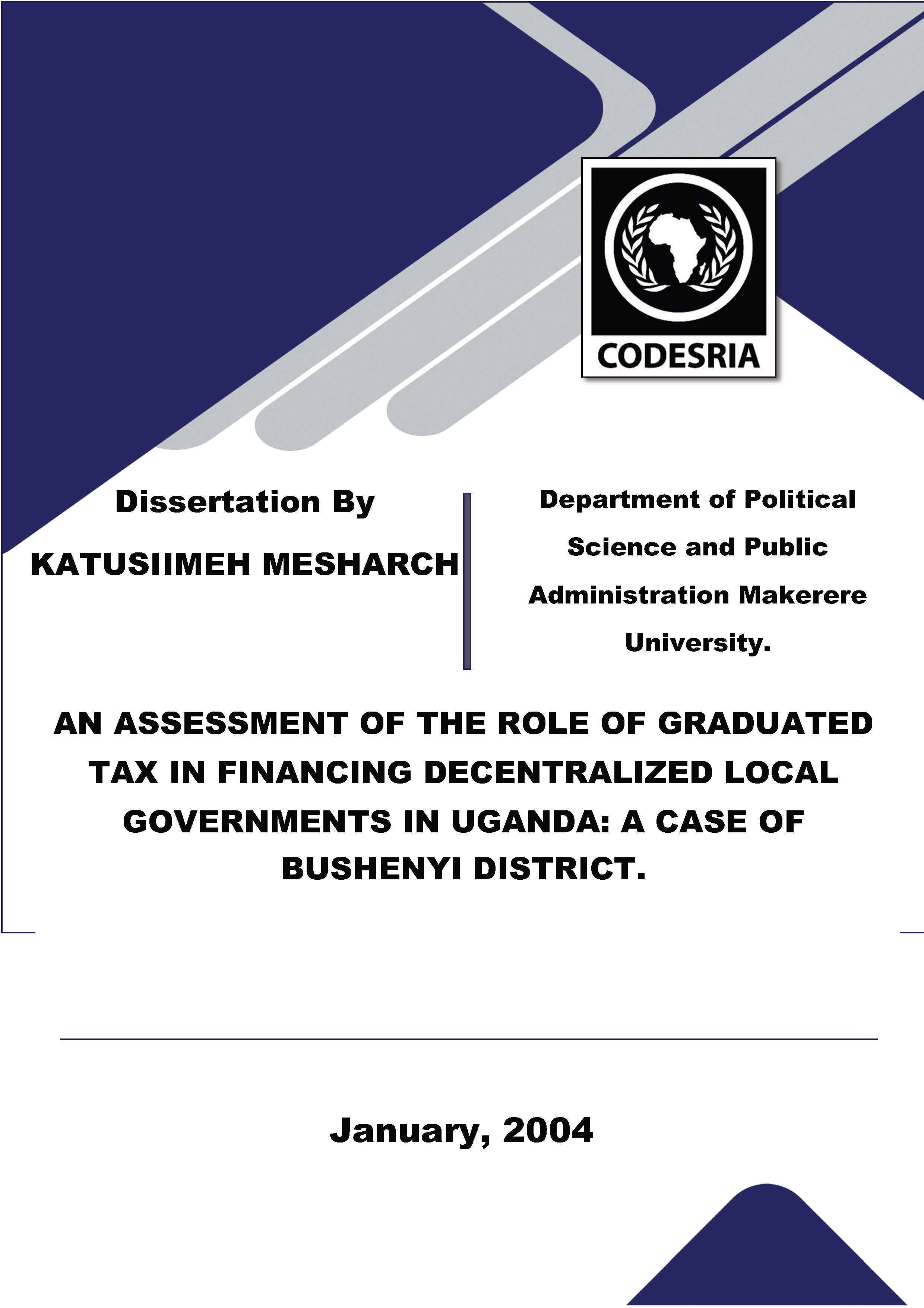AN ASSESSMENT OF THE ROLE OF GRADUATED TAX IN FINANCING DECENTRALIZED LOCAL GOVERNMENTS IN UGANDA: A CASE OF BUSHENYI DISTRICT.
Keywords:
Local government, tax collection, local finance, decentralization, financing, tax exemptions, tax, UgandaSynopsis
the use of Graduated Personal Tax (GPT) as a means of financing decentralized local governments in Uganda. There are those who argue very strongly in favor of the abolition of GPT while others see it an indispensable means of financing local services. Those who argue for its abolition see it as a primitive tax, regressive in nature, offensive and sometimes dehumanizing to the population especially the poor. They further argue that the assessment of GPT and its exemption procedures are disputable and subjective and fraught with corruption.
The study set out to investigate the extent to which GPT can finance Local Governments in Uganda. The key focus of the study was on the following issues; revenue adequacy, the nature of local finance, the way the tax is assessed, the methods of tax collection, the way in which revenue is disbursed and finally how this revenue is utilized.
Methodologically, this study adopted a retrospective cross-sectional design by employing both qualitative and quantitative methods of data collection.. The study was carried out in Bushenyi District in Western Uganda. One sub-county was selected for the study that is Kagango sub-county. The district was selected mainly because of numerous press reports alleging the decline in revenue generation. The major source of information was documentary review on district and sub-county budgets. This was backed up by information from key informants like technocrats and politicians at the sub-county and district level and the local populace who pay taxes. Qualitative data was analyzed using thematic coding while quantitative data especially generated from sub-county and district budgets and from the questionnaires were analyzed descriptively using tables.
The major findings of the study revealed that Local Government revenues at the sub-county are inadequate though it was clear from the respondents and the budgets that GPT is the mainstay of local governments. One critical factor leading to this low revenue generation is the way in which local councilors interfere with the way these resources are raised and utilized. In terms of assessment, the majority of the respondents stated that GPT does not reflect the ability to pay. More specifically, they said it is not proportional because the rich are taxed lowly while the poor are taxed highly and harshly. It was also noted that those who assess the taxes are ill trained and poorly motivated. For instance, tax assessors use the desk assessment system that does not accurately indicate the reality of how much one should be taxed; and non declaration of assets and underassessment of the taxpayers were vividly mentioned. The study also revealed that some methods of tax collection are quite unpopular and that contrary to what was expected, the study revealed that that the costs of tax collection were low.
In addition, whereas financial decentralization was meant to define GPT as a form of tax that is supposed to be generated by the locality and, indeed, owned by it, the central government still interferes in its administration thus affecting the way it is raised and utilized. Coupled with this interference is the fact that the district takes a large share of the revenues disbursed to the sub-counties adversely affecting service delivery at lower levels.
Downloads
References
Alderfer, Harold F., (1964), Local Government in Developing Countries, New York: Mc Graw-Hill Book Company
Allen J, (1990), Cultivating the grassroots: Why Local Government Matters, The Hague: International Union of Local Governments.
Arnstein, Sherry R., (1969), A Ladder of Citizen Participation. Journal of the American Institute of Planners, Vol. 35: 216-224.
Babin, D. and Bertrand A., (1998) Managing Pluralism: Subsidiarity and patrimonial mediation, Unasylva. 194, 49: 19-25.
Bahr Roy W., and Linn Johannes F., (1992), Urban Public Finance in Developing Countries, Washington D.C: Oxford University Press.
Bird Richard, M., (2001), “User charges in local government finance” in Mila Freire & Richard Stren (eds.), The challenge of urban government: Policies and practices, Washington: World Bank.
Crook Richard and James, Manor, (1994) Enhancing Participation and Institutional Performance: Democratic Decentralization in South East Asia and West Africa, London: Overseas Development Administration.
Cullis John and Jones Philips (1998) Public Finance and Public Choice, Oxford: Oxford University Press.
Davey Keneth J., (1974), Taxing a Peasant Society, London: Charles Knight and Company Limited.
Downs Anthony (1957) An Economic Theory of Democracy, New York: Harper and Row






